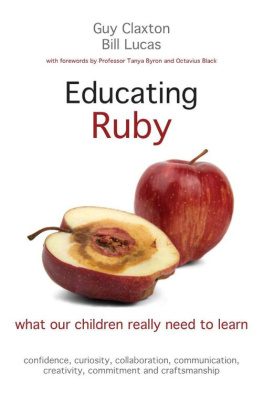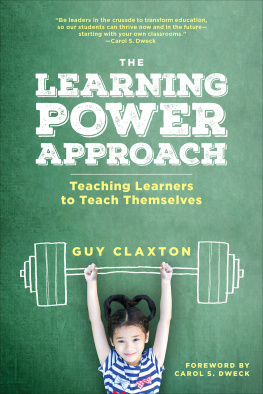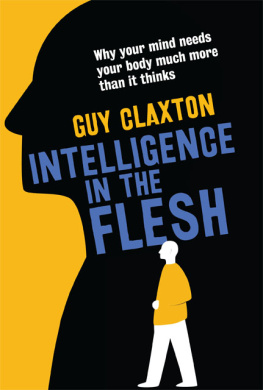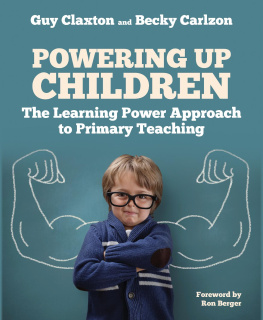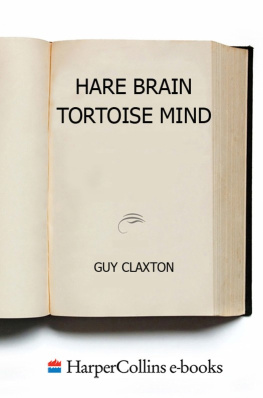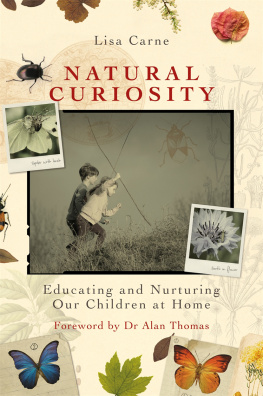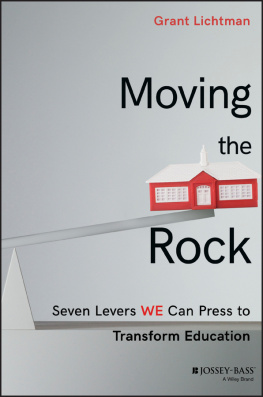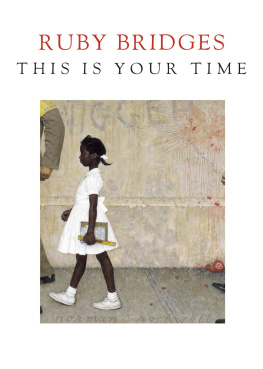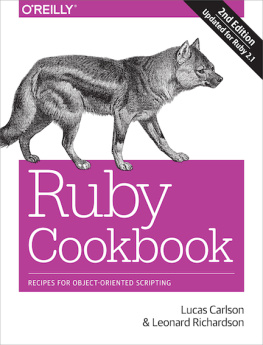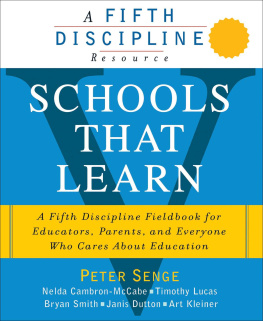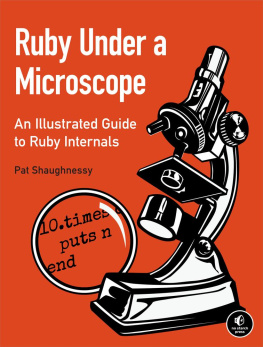Praise for Educating Ruby
It was a teacher that changed my life; not because he taught me my times tables but because he helped me rebuild my confidence through my parents divorce. I am Ruby, you are Ruby, we are all Ruby. Thank you Guy Claxton and Bill Lucas for breaking us out of the battery farm.
Richard Gerver, author of Creating Tomorrows Schools Today
Good schools have always focused on results plus, helping children achieve their potential in examinations and at the same time developing confident and creative individuals who are keen to do their very best. Guy Claxton and Bill Lucas are absolutely right to remind us of the need for more expansive approaches. Educating Ruby is a timely reminder of how increasingly important it is not to focus on just part of what matters at school.
Brian Lightman, General Secretary, ASCL
It is essential that schools educate the whole child. I strongly support the line of argument made by Bill Lucas and Guy Claxton that schools are about so much more than examination results. Educating Ruby is essential reading for everyone who cares about the future of education in our country.
Tony Little, Head Master, Eton College
The UK school system is in urgent need of reform. EducatingRuby teems with practical, evidence-based, inspiring ideas for teaching and learning, that will brighten the lives of over-tested students, stressed-out teachers and concerned parents. And when politicians are finally ready to be pointed in the right direction, its just the book for them too.
Sue Palmer, literacy specialist and author of Toxic Childhood
A powerful, heartfelt and expert analysis of whats going wrong in the education of our children and how to put it right.
Sir Ken Robinson
Examination grades are important, but they are only half the story of education. Parents send their children to schools like my own because they know we build the kinds of character and roundedness that this book puts its finger on. Its what all schools everywhere should be doing. Guy Claxton and Bill Lucas speak for schoolchildren and their parents everywhere.
Sir Anthony Seldon, Master, Wellington College
The need for a knowledge-rich curriculum is beyond dispute but this provocative book should make all teachers and school leaders think deeply about what is taught and how. A broad range of ideas encompassing deep scholarship, character building and creativity are set out with passion and clarity including practical suggestions for schools and parents. Its going to wind some people up but thats a good thing.
Tom Sherrington, Head Teacher, Highbury Grove School
The schools of tomorrow are here today but are too few and far between. We wont get the speed and scale of change without real political will which is currently lacking. Educating Ruby is a brave attempt to mobilise parent power to get that change to happen. I really hope it succeeds!
Matthew Taylor, Chief Executive, RSA
Most people believe schools should do their bit to help children become rounded individuals as well as developing their intellectual strength. The obsession with measuring our schools through testing their pupils means that too many children are on a relentless treadmill which is self-defeating. Ruby and her friends need an education with all its richness, with teachers who bring learning alive and supported by parents who play their full part. It is not too complicated and Educating Ruby explains why the system needs to change and what everyone can do about it.
Mick Waters, Professor of Education, Wolverhampton University
What would schools look like if they taught children what they really need to know? Could we ever have schools like that? Educating Ruby is thoughtful, provocative and optimistic. As ever, Guy Claxton and Bill Lucas are wise and experienced voices on the cutting edge of education. All teachers and parents should read this book theyd learn lots, and enjoy it!
Hilary Wilce, author of Backbone: How to Build the Character Your Child Needs to Succeed
Educating Ruby is a must read book for all stakeholders in education. Guy Claxton and Bill Lucas show how we can have happy, positive young people with skills, attitudes and habits of mind; who are knowledgeable and capable of passing examinations.
Sue Williamson, Chief Executive, SSAT
Whether you agree or disagree with Educating Ruby, youll certainly be engaged, stimulated and challenged.
Robert Wilne, founding Head Master, London Academy of Excellence
Acknowledgements
Thanks to:
Kayla Cohen, Bryan Harrison, Tom Middlehurst and Hilary Mackay Martin.
All those who spoke to us so openly about their own or their childs experiences of school.
The many head teachers and teachers with whom we are lucky to work, who are already putting these kinds of ideas into practice.
Our gurus: Professors Art Costa, David Perkins, Howard Gardner, Tanya Byron and Carol Dweck.
And our families: Henrietta, Jude, Tom, Bryony and Peter.
Contents
Foreword by Professor Tanya Byron
I struggled at school. It was a highly academic girls school, and its hot-house atmosphere didnt suit me. At one teachers meeting, my parents and I were told, Tanya will never be a high-flyer.
Jo Malone, the multi-millionaire businesswoman and fragrance queen, was told by a teacher that she was lazy (Jo is dyslexic) and would never make anything of her life. Albert Einstein, Thomas Edison and thousands of others were written off by their teachers because their way of learning didnt fit that of the school.
As a clinical psychologist working in child and adolescent mental health, I often meet children and young people who are struggling at school to such a degree that it has severely compromised their mental health and daily functioning. There are thousands of children today who are showing increasing rates of depression and anxiety disorders, struggling to hold on to a positive sense of self-worth. Some literally give up. And their parents are at their wits end wondering what to do for the best.
While the mental health of our young is a complex, multifaceted issue driven by biological, psychological and social factors, I believe that the current education system is out of date and out of step with the learning needs and habits of young people. Some 50% of all adult mental health problems start at the age of 14, a time of life when the prefrontal cortex undergoes huge changes in function, when risk-taking is a developmental imperative on the road to individuation, and when puberty adds sexual, social and identity challenges. Children who struggle are not lazy, stupid or babyish; they just dont fit with this antiquated system.
School should foster a love of learning and enquiry, a thirst to discover and uncover, a sense of fun and creativity, whether learning about the past or developing ideas for the future. Yet many academics, like myself, who work in the fields of child development, education and mental health are increasingly concerned. We are deeply worried that our young people are being force-fed, over-tested and misunderstood, and are suffering as a result. They are taught to pass exams but not necessarily taught to think in their own unique way and on their own terms.
Our digitally literate and highly curious young people sit in classrooms where learning is delivered in ways that do not connect with the ways they think, learn and create. Furthermore, children from disadvantaged backgrounds, those with learning difficulties, or simply idiosyncratic learning styles, are never going to leave school feeling successful and empowered to carry on learning and thinking for themselves. This is not trendy sentiment, as some would have us believe, but a matter of hard fact. Those of us who have raised these concerns have been called The Blob by policy-makers and politicians, and the hostility that exists between them and teachers is at an all-time high.

